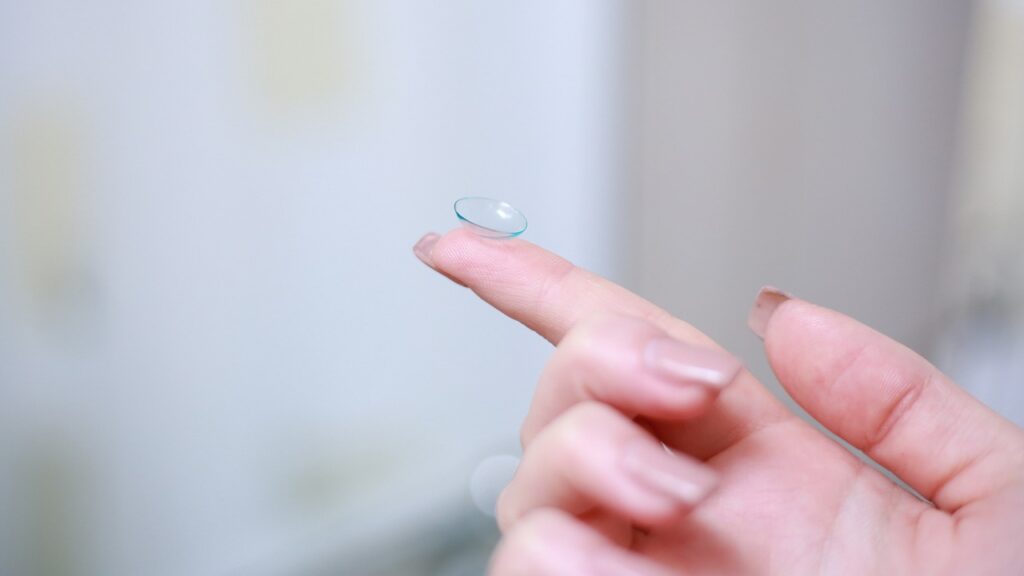Deciding between lenses or prescription glasses is a common dilemma for anyone with vision correction needs. Both options have pros and cons, and the choice often depends on your lifestyle, comfort preferences, and how you want to look and feel. So, when it comes to the debate of contact lenses or glasses, Let’s break it down and help you figure out which option might suit you best.
For most people who require vision correction, the big question is whether to choose contact lenses or glasses. While both options serve the same fundamental purpose—correcting your vision—there are many factors to consider when choosing one over the other. The decision can impact your daily life in terms of convenience, comfort, and even style. Whether you’re nearsighted, farsighted, or have a level of astigmatism, the choice between lenses or glasses comes down to personal preference. Let’s explore the benefits and drawbacks of each to help you decide which is better for you.
Comfort and Convenience
When it comes to comfort, both lenses and glasses have their own unique set of challenges and advantages. The first factor to consider is how they feel during daily wear and what suits your routine.
Glasses: Easy and Low Maintenance
For many, glasses are the go-to option because they’re easy to put on and take off. You don’t need to worry about touching your eyes or dealing with lens solution. Glasses are also less likely to cause eye irritation, making them ideal for people with sensitive eyes or allergies. Plus, they serve as a fashion statement, with glasses frames available in countless styles and colors. However, it’s important to consider the quality of your eyewear.
However, glasses can sometimes be a hassle. They can fog up in cold or humid weather, slide down your nose, and may interfere with activities like sports. If you’re active or always on the go, glasses might feel like more of a hindrance than a help.
contact Lenses: Versatile and Active-Friendly
If you’re looking for a more versatile option, contact lenses might be the answer. Unlike glasses, lenses provide unobstructed peripheral vision and don’t get in the way of activities like running or cycling. Contact lenses also stay put during movement, making them an ideal choice for those who live an active lifestyle.
However, wearing contact lenses requires more maintenance. You’ll need to clean and store them properly to avoid eye infections. Some people may also find lenses uncomfortable, particularly after long hours of wear. For others, the thought of putting something directly on the eye is unsettling. So, when weighing comfort and convenience, the answer to “lens or glasses: which is better” really depends on your daily routine and how you like to move through the day.

Aesthetic and Style
Another factor that influences the lens or glasses decision is how each option affects your appearance. Both lenses and glasses offer different aesthetic benefits, and the choice depends on your personal style.
Glasses: A Fashion Statement
Glasses are no longer just a tool to correct vision; they’ve become a stylish accessory. With so many frame shapes, colors, and materials available, glasses allow you to express your personality. Whether you prefer a classic, professional look or a trendy, bold frame, glasses can enhance your overall appearance. They also highlight your facial features, allowing you to experiment with different styles depending on your mood.
However, some people feel self-conscious wearing glasses. If you don’t like how glasses look on your face, or you think they hide your features, contact lenses can offer a more subtle solution.

Contact Lenses: Natural and Invisible
If you prefer a more natural look, contact lenses are practically invisible. They allow your natural eye color and face to shine without any frames in the way. For those who dislike the idea of constantly wearing something on their face, contact lenses offer a seamless alternative.
Additionally, lenses can be a fun way to change up your look, as colored lenses allow you to experiment with different eye colors. So, whether you prefer a bold, framed look or a more natural appearance, it depends on your personal style.
Eye Health and Vision Quality
Your decision should also factor in eye health and how well each option meets your vision needs. Glasses and lenses offer different benefits when it comes to correcting vision and maintaining eye health.

Glasses: Safe and Simple
One of the major benefits of glasses is that they don’t come into direct contact with your eyes, reducing the risk of infection or irritation. Additionally, glasses help shield your eyes from environmental factors like wind, dust, and allergens.
In terms of vision correction, glasses may provide more consistent clarity, as they don’t shift around like contact lenses sometimes can. However, they do have limitations in peripheral vision because the frame edges can block some of your view.
Contact Lenses: Precise Vision and Flexibility
Contact lenses sit directly on your eye, which can provide more precise and natural vision correction. You’ll have a full field of view with no frame edges to block your peripheral vision. This is especially helpful for activities that require sharp, all-around focus.
However, wearing lenses can lead to eye strain or dryness, especially after long periods of use. People who spend a lot of time in front of screens may experience discomfort, and if your eyes feel heavy, it could be a sign to reassess your lens usage. Additionally, contact lenses can increase the risk of eye infections if they’re not properly cleaned and maintained.
Cost and Maintenance
Finally, cost and maintenance are significant factors when deciding between lenses and glasses. Both options have ongoing costs, but they vary in terms of long-term expenses.
Glasses: A One-Time Investment
Glasses can be a more economical choice over time. While they may have a higher upfront cost, especially if you go for designer frames or special lenses like blue-light glasses, they typically last a long time. Aside from occasional adjustments or repairs, glasses don’t require as much ongoing maintenance compared to contact lenses.
Contact Lenses: Recurrent Costs
Contact lenses, on the other hand, have recurring costs. You’ll need to purchase new lenses regularly, whether you use daily, weekly, or monthly lenses. You’ll also need to buy lens solution and cases for storage and cleaning. Over time, these costs can add up, making lenses a more expensive option for many people.
Conclusion
So, lens or glasses: which is better? The answer depends on your personal preferences, lifestyle, and vision needs. Glasses offer simplicity, lower maintenance, and a chance to express your style, while lenses provide flexibility, natural vision, and active-friendly wear. Ultimately, both options have their merits, and it’s up to you to decide which one aligns best with your daily life.
Have you had experiences with both lenses and glasses? Let us know your thoughts and preferences in the comments below. We’d love to hear from you!
For a wide selection of glasses and contact lenses, check out Optics4Less for the best deals and styles suited to your needs.

